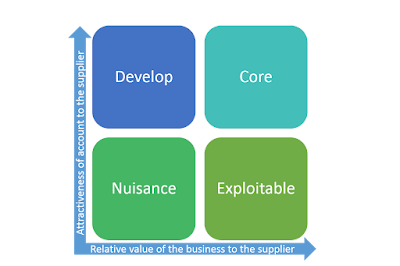
As ever the blogs seem to concentrate on the enablers for effective working rather than the procurement tools and techniques covered in the workshop. And yes there's a degree of similarity in the index between Category Management and the Supplier Management workshops - not because the procurement tools were similar - but because soft skills, change management, communication, influencing and creativity are common enablers, and are all skills requiring development and use in all aspects of procurement activity.
The Enablers (in no particular order - and I'm not expecting anyone to want to read every blog - just any that either pique your interest as you read the title - or for those who have attended the workshops - topics you wanted to explore further)
- Unconscious incompetence through to unconscious competence - a reminder to open our minds to new learning
- Standing in the shoes of your stakeholders - to provide an alternate perspective
- What motivates your stakeholders - ie how to get them motivated to listen, and then to take action
- We see others through our own lenses - a warning not to make assumptions about other people's preferences - ie they may not be 'just like you' as much as you think
- How big is your Johari window - do you have your head in the sand about your own behaviours and the contribution they're making to the situation
- Creative thinking , creative environments and use of the Creative Whack Pack
- Implementing change - based on Kotter's book 'Our Iceberg is melting'
- Why do I have to adapt my style? The answer being, you don't have to adapt if what you're doing is delivering the outcome you want. If you want a different outcome you can either continue to do what you're doing, or change.
- The subtleties of influencing
- Communication styles
- Language that improves rapport - ie reducing the opportunity for barriers to be raised
- Rapport - people like people who are like themselves, and aim to minimise the differences between themselves and others
- Having a chocolate moment - based on an exercise I often use with groups to help highlight that we use words assuming common interpretation
- Game playing - if senior stakeholders (or suppliers for that matter) are playing games do you join them or not?
- Are you a toxic leader - links to the game playing above
- Organisation's operating metaphors - links to the 'games' we might be playing - war? race?
- Personal metaphors that run our life - as above
- How our values impact our relationship with others
- Business values - and how they're not the same as personal values
- Looking for the worst in people - beliefs can play a part in the outcome we get
- Developing relationship trust - a useful checklist if trust doesn't seem to be developing in a relationship that needs it
- Trust and respect - is your language clear
- Show them what you don't want - as much as what you do want
- What does respect look like to you - and is it the same for them?
- How do we define honesty?
- Language of slopey shoulders - who, if not you, is 'the organisation' or 'they' you speak of.
- The language of change and transformation
- How do I spell Can't ........... W O N T - insight from my personal training session when I said I couldn't do something!
- Procurement: Mr Wolf or Enlightened
- The Assertion scale - are you too passive or aggressive?
- Saying Thank You and showing gratitude
- Frameworks for change coaching process - ie the insight and setback cards - although you could buy these to use yourself or these
- Collage - see here for a Pinterest board of collages you could use to apply this process in the office
- Using Nature as a metaphor for situations in our lives - my landscaping your life blog
- Using our language - can't see the wood for the trees, or going around in circles (updated with insight from recent workshop)
- Walking Meetings
- Metaphor - and why it's soooooooooo effective
- Creative Whack Pack
- Doing something different everyday for 28 days
- Supplier relationship management or relationship management - what's in a name?
- How attractive are you to your suppliers (per picture above with a 5th strategy - to walk away)
- Gardening as a metaphor for supplier management - because suppliers need weeding, feeding, pruning and mowing and internal stakeholders can understand procurement better by using this metaphor.
- The cost of getting procurement wrong - Pinterest board of horror stories of supplier management gone wrong! That is added to on an ongoing basis.
- Risk management - lessons from closure of the forth road bridge for 3 months
- Managing problem suppliers - more for those new to SRM
- How to deal with a tricky suppliers - a reminder
- Is your supplier management like a thermostat?
- Are you KPIs inspiring positive change?
- How do you deal with tricky senior stakeholders
- If the earth was a supplier
- How's your suppliers' mental health
- Will you change the buyer / supplier archetype?
- Wining together or are you suppliers the losers - are we on the same team or competitors of our suppliers
Future blogs that I would like to write following discussions during the workshop(s) include:
- Problem reversal - a great technique for problem solving.
- What's in a word - would relationship management be a better term than supplier relationship management? See picture for what we think the 3 different interpretations of 'supplier management' might be dependant on whether we're procurement, a supplier or an internal stakeholder.
- The language of stick and carrot - because we need to be consciously aware of which of these we're using.
- The link between mind, body and emotions.
- More on organisational and personal metaphors and the words we use for each (exploit, attach, fight, war, threat and enemy are words that work well for those operating a war like metaphor, but won't work with someone who operates a nature like metaphor for their life).
- Use of pipe cleaners to solve problems!?!
I also mentioned a few of my rants during the session, and an index of all my rants can be found by following this link (The common theme seems to be the lack of humanity with which we often treat each other!)
Alison Smith
The Purchasing Coach
Inspiring change inside and out (more here on why that's important)











